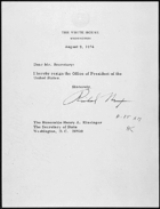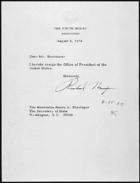
Letter of resignation
Encyclopedia

Such a letter will often take legal effect to terminate an appointment or employment, as notice under the relevant terms of the position; many appointments and contractual employments are terminable by unilateral notice, or advance notice of a specified period of time, with or without further conditions. Even where an oral notice would be effective, the effective date or time of termination may be directly or indirectly fixed on delivery of a written letter or email, for the sake of clarity and record. In response, different arrangements may be made or agreed, such as an earlier effective date, or improved terms and conditions of appointment upon withdrawal of the letter.
It should normally delivered in advance to the appropriate supervisor or superior, and contain such information as the intended last day at work. A period of notice may be required expressly by contract, impliedly by the pay interval, or otherwise. Nevertheless, in practice, some resignations can be effective immediately.
For courtesy's sake, a letter of resignation may thank the employer for the pleasure of working under them and the opportunities and experience gained thereby, and also offer to assist with the transition by, for example, training the replacement. A more hostile letter may assert other sentiments or claims, particularly that the contract or terms of employment have been broken. In any case, the terms of the letter and its consequences may often be negotiated, either before or after delivery.
A formal letter with minimal expression of courtesy is then-President of the United States
President of the United States
The President of the United States of America is the head of state and head of government of the United States. The president leads the executive branch of the federal government and is the commander-in-chief of the United States Armed Forces....
Richard Nixon
Richard Nixon
Richard Milhous Nixon was the 37th President of the United States, serving from 1969 to 1974. The only president to resign the office, Nixon had previously served as a US representative and senator from California and as the 36th Vice President of the United States from 1953 to 1961 under...
's letter of resignation, under the terms of the US Constitution. Delivered to then-Secretary of State
Secretary of State
Secretary of State or State Secretary is a commonly used title for a senior or mid-level post in governments around the world. The role varies between countries, and in some cases there are multiple Secretaries of State in the Government....
Henry Kissinger
Henry Kissinger
Heinz Alfred "Henry" Kissinger is a German-born American academic, political scientist, diplomat, and businessman. He is a recipient of the Nobel Peace Prize. He served as National Security Advisor and later concurrently as Secretary of State in the administrations of Presidents Richard Nixon and...
on 9 August 1974, it read simply, "I hereby resign the Office of President of the United States." It was simply dated, but the recipient also recorded upon it the time of receipt, at which it took effect with important consequences under the Constitution.

